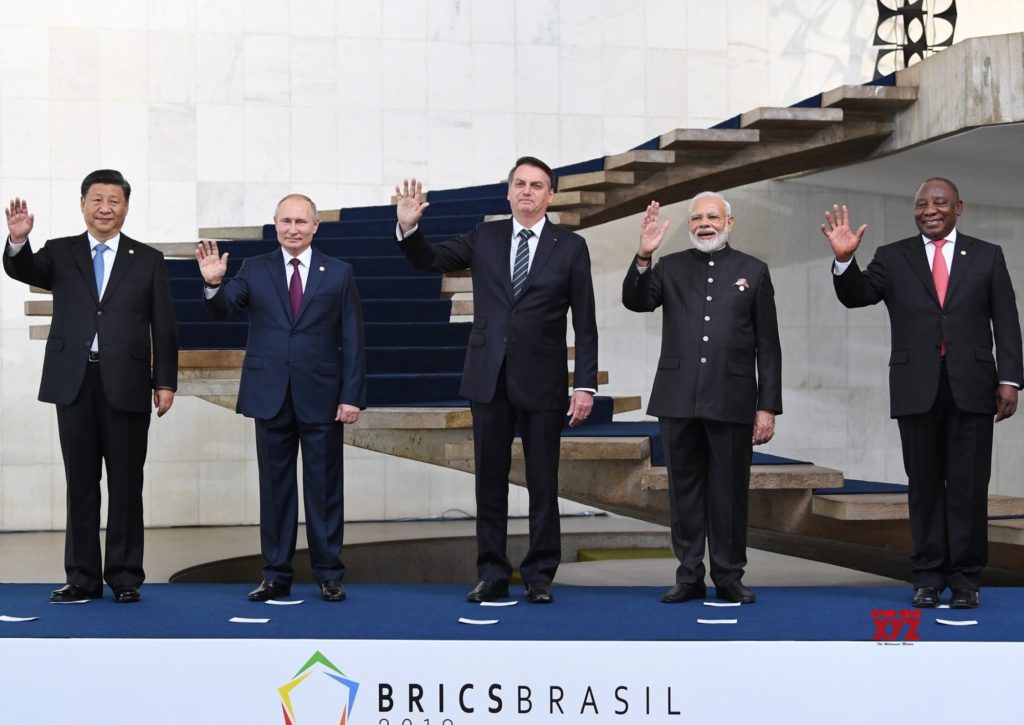Brasilia BRICS summit stresses on multilateralism, reforms, anti-protectionism
The declaration also came down heavily against terrorism.
Photo: Agencies

By Aditi Bhaduri
The 11th BRICS summit, taking place at Brasilia, concluded today with strong emphasis on upholding the multi-lateralism and upholding central role of the UN in international affairs and respecting international law.
All five BRICS member states -Brazil, Russia, India, China and South Africa affirmed their commitment to multilateralism and urged the international community to strengthen and reform the multi-lateral system.
In the joint statement released at the end of the two day summit the member states reiterated “the urgent need to strengthen and reform the multilateral system, including the UN, the WTO, the IMF and other international organizations, which we will continue working to make more inclusive, democratic and representative, including through greater participation of emerging markets and developing countries in international decision-making.”
The BRICS also reiterated their “commitment to shaping a more fair, just, equitable and representative multipolar international order.”
They urged long-pending UN reforms, including to the Security Council, in order to make “it more representative, effective, and efficient, and to increase the representation of the developing countries so that it can adequately respond to global challenges” China and Russia reiterate the importance they attach “to the status and role of Brazil, India and South Africa in international affairs and support their aspiration to play a greater role in the UN.” All these three member states aspire to permanent seats in the UN.
With western sanctions against Russia and the ongoing US-China trade war, the BRICS came out strongly against anti-protectionism, and called for “open markets, fair, just and non-discriminatory business and trade environments, structural reforms, effective and fair competition, promoting investment and innovation, as well as financing for infrastructure and development.”
Earlier, addressing the summit Chinese President Xi Jinping had said, “Protectionist and bullying counter-currents bring shocks to international trade, adding to downward pressure on the world economy.”
Calling for quota and governance reforms in the International Monetary Fun, the summit declaration also called for WTO reforms urging members states to “avoid unilateral and protectionist measures, which run counter to the spirit and rules of the WTO.”
“We reiterate the fundamental importance of a rules-based, transparent, nondiscriminatory, open, free and inclusive international trade. We remain committed to preserving and strengthening the multilateral trading system, with the World Trade Organization at its center,” the statement read.
The countries have also pledged to increase intra-BRICS trade.
The BRICS declaration also came down strongly against terrorism, without naming any specific group, like in the earlier past coupld of summits. Condemning terrorism in all its forms and manifestations, “which should not be associated with any religion, nationality or civilization, and recognize terrorist acts as criminal and unjustifiable, regardless of their motivations whenever, wherever and by whomsoever committed……..We recall the responsibility of all States to prevent financing of terrorist networks and terrorist actions, including those from their territories”, and again reiterted support for the speedy conclusion and adoption of the Comprehensive Convention on International Terrorism within the UN framework.”
The statement also emphasised the importance of preventing and combating the financing of terrorism, implementing relevant UNSC resolutions and combatting illicit financial flows and “pledged to closely coperate within Financial Action Task Force (FATF) and the FATF-sytle regional bodies as well as in other multilateral, regional and bilateral fora.”
This was particularly pertinent for India as last month the global watchdog for terror financing had issued a strong warning to Pakistan – India’s archrival and China’s “all weather friend” – for not doing enough to control and combat terror financing. Pakistan has been kept on the “grey list’ and if it fails to comply with the action plan given to it by February 2020 then it falls into the danger of being placed on the black list.
The joint statement also voiced support for the implementation of the Paris Agreement adopted under the principles of the United Nations Framework Convention on Climate Change (UNFCCC), and urged developed countries “to scale up the provision of financial, technological and capacity-building assistance to developing countries to support
mitigation and adaptation action.”
Last week, on November 4th, the US -the world’s largest economy – had formally notified the United Nations that it would withdraw the United States from the Paris Agreement on climate change.